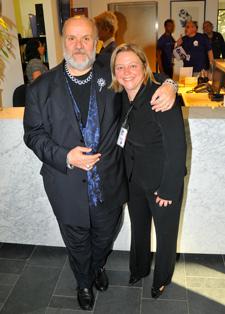As Xtra goes to press, the list of people tapped to serve on Pride Toronto’s (PT) advisory panel remains under wraps. But Metropolitan Community Church of Toronto pastor Brent Hawkes says that he will act as the body’s chair, and the identities of the other panellists will be revealed before the end of August.
The panel came about as part of PT’s June resolution to rescind its censorious ban on the phrase “Israeli apartheid” in this year’s Pride parade. Made up of “LGBTTIQQ2SA leaders and friends,” the panel is to “consult with the community” and make recommendations “regarding Pride Toronto’s ongoing working relationship with the broader LGBTTIQQ2SA communities.”
519 Church Street Community Centre executive director Maura Lawless consulted with an unnamed group of community organization executive directors in compiling the list of would-be panellists. Hawkes says he also consulted with MPP Glen Murray, mayoral candidate George Smitherman and Ward 27 city Councillor Kyle Rae. A list of 15 potentials was submitted to and approved by the PT board of directors.
Why the secrecy? Why not tell everyone who these people are and precisely how and why they were chosen?
In an Aug 6 interview, Hawkes told Xtra that he wants to be sure the panellists agree to the work before he reveals their names. He says that of the 15 potentials, only seven panellists are needed. The extras are there in case any of Hawkes’ top seven are unwilling or unable to participate.
“It’s not fair to say who’s on the list at this point, because some people will be approached and other people won’t be approached,” says Hawkes. “As soon as we have a panel of seven, we’ll announce it.”
Hawkes does confirm that some of the prospective panellists are visible members of the movement pressing for change at PT. But, he says, he was careful not to include polarizing figures.
“Having a panel that includes the opposite ends of the spectrum is not going to work,” he says.
Still, Hawkes says he hopes the panel’s work will effect positive change at PT.
“I personally think that one of the flaws in the current system is that the board of Pride Toronto is both a policy and a management board,” he says for example. “There are likely at least five really capable community members who could be trusted to make policy decisions for Pride but who maybe don’t have time to organize the festival. We need to look at that.”
So, if a shift to a policy board model is indicated, and if PT is out of touch with its own queer constituents, then aren’t new PT board members what’s really needed? Doesn’t that make more sense than an advisory panel of dispassionate figures charged with making recommendations that may or may not be adopted?
Hawkes says that may be true, but it’s a question that lies outside the advisory panel’s mandate. He says he expects the panel will be effective.
“I’m hoping both the independence in this process and the players in this process will make it such that whatever the recommendations will come with a lot of clout.”
According to PT’s bylaws, the annual general meeting, at which new directors and co-chairs are elected, must be held no later than four months after the Pride celebration. It’s scheduled for Sept 23.
“That’s an awkward situation because we can’t move that fast,” says Hawkes. “But we have to have the work done as quickly as possible because if there are going to be structural changes or any programming changes, then Pride needs to know that so they can get to work on it.”

 Why you can trust Xtra
Why you can trust Xtra


